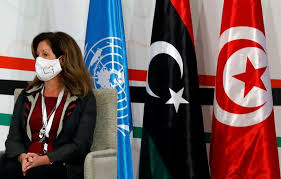Libya talks make progress towards new temporary government, U.N. says
Tunis (Reuters) – A Libyan political dialogue arranged by the United Nations has made progress towards agreeing a new transitional government to oversee the run-up to elections in December, the U.N. said on Saturday.
Participants at talks in Geneva agreed on a mechanism for choosing the new government, whose formation has been the subject of wrangling among the main factions in a country that is a major oil producer.
Acting U.N. Libya envoy Stephanie Williams said the agreement represented the “best possible compromise” on the issue and could lead to the selection of a transitional government “in several weeks”.
However, she also warned that there would still be “people seeking to obstruct” peacemaking efforts.
The talks are part of a wider peace process, after years of chaos and warfare, which also involves a military ceasefire and an economic track.
Libya has been split since 2014 between rival factions in Tripoli, in the west, and Benghazi in the east.
The Government of National Accord (GNA) in Tripoli is backed by Turkey, while Khalifa Haftar’s eastern-based Libyan National Army (LNA) is supported by the United Arab Emirates, Russia and Egypt.
However, both sides themselves represent sometimes unstable coalitions of different political, regional and armed factions.
The latest push towards peace began after the GNA turned back a 14-month LNA assault on Tripoli in June. A ceasefire was agreed in Geneva in October.
In November, the United Nations invited 75 Libyans to join a political dialogue in Tunis, which set a date of Dec. 24 this year for presidential and parliamentary elections and agreed on the need for a new, unified transitional government.
The transitional government will be responsible for preparing for the elections, combating corruption and restoring public services across Libya, Williams said.
However, November’s Tunis meeting stalled when the delegates started discussing the make-up of the new government. Saturday’s agreement was made by a smaller committee drawn from the participants.
All 75 members of the dialogue will vote next week on the mechanism the Geneva committee agreed on Saturday.



